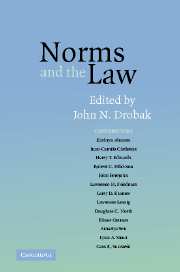Book contents
- Frontmatter
- Contents
- List of Contributors
- Acknowledgments
- Introduction
- PART ONE RATIONALITY AND NORMS
- PART TWO NORMS OF THE COMMONS
- 4 Norms of the Household
- 5 .commons
- 6 How Norms Help Reduce the Tragedy of the Commons: A Multi-Layer Framework for Analyzing Field Experiments
- PART THREE JUDICIAL NORMS
- PART FOUR THE INFLUENCE OF LAW ON NORMS
- References
- Index
6 - How Norms Help Reduce the Tragedy of the Commons: A Multi-Layer Framework for Analyzing Field Experiments
Published online by Cambridge University Press: 05 June 2012
- Frontmatter
- Contents
- List of Contributors
- Acknowledgments
- Introduction
- PART ONE RATIONALITY AND NORMS
- PART TWO NORMS OF THE COMMONS
- 4 Norms of the Household
- 5 .commons
- 6 How Norms Help Reduce the Tragedy of the Commons: A Multi-Layer Framework for Analyzing Field Experiments
- PART THREE JUDICIAL NORMS
- PART FOUR THE INFLUENCE OF LAW ON NORMS
- References
- Index
Summary
INTRODUCTION
Contemporary economic theory is one of the more successful, empirically verified social science theories to explain human behavior. It does best, however, in the settings for which it was developed – the exchange of private goods and services in an open, competitive market. The theory is based on a theory of goods, a set of rules for social exchange, and a model of human behavior. When the goods involved are easily excludable and rivalrous, and individuals are interacting in a competitive market, theoretical predictions have strong empirical support. When the goods involved are not easy to exclude – such as public goods or common-pool resources (CPRs) – conventional theoretical predictions receive much less empirical support. In a static setting, the conventional predictions are that individuals will not produce public goods and that they will overharvest common-pool resources. The evidence for both predictions is mixed.
In “public goods” experiments, for example, instead of contributing nothing to the provision of a public good, as is predicted by neoclassical theory for individuals pursuing material payoffs, individuals tend to contribute, on average, between 40 to 60 percent of their assets in a one-shot game. In repeated games, the average level of contribution starts at around 50 percent but slowly decays toward the predicted zero level. With non-binding communication – cheap talk – participants are able to sustain cooperation in public goods experiments for long periods of time.
Information
- Type
- Chapter
- Information
- Norms and the Law , pp. 105 - 136Publisher: Cambridge University PressPrint publication year: 2006
Accessibility standard: Unknown
Why this information is here
This section outlines the accessibility features of this content - including support for screen readers, full keyboard navigation and high-contrast display options. This may not be relevant for you.Accessibility Information
- 6
- Cited by
